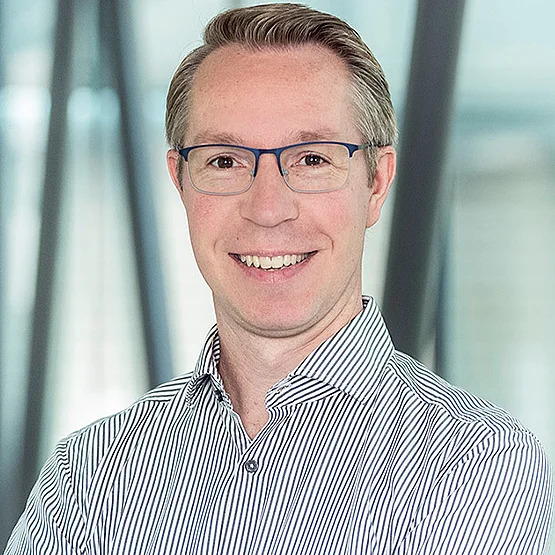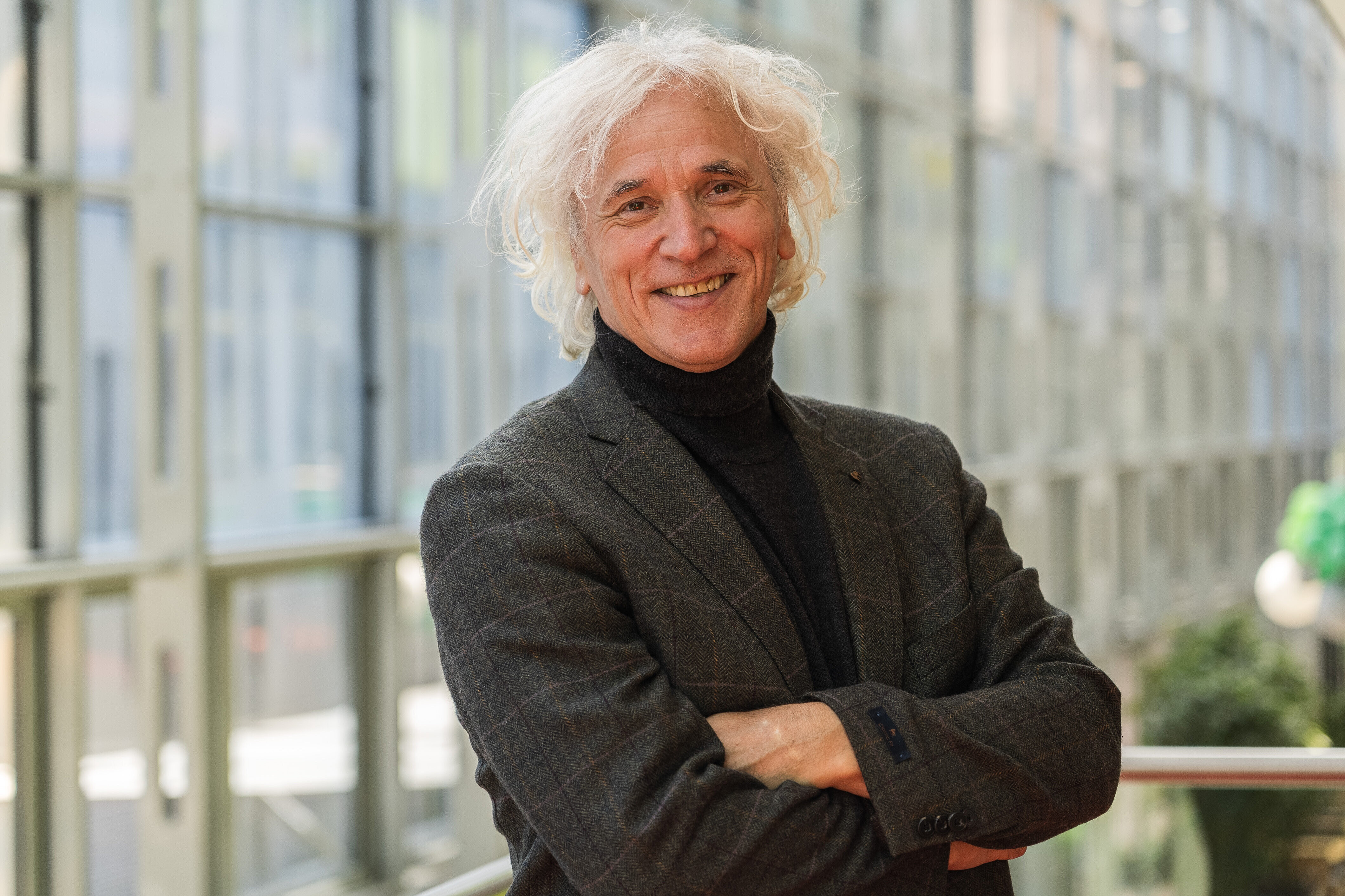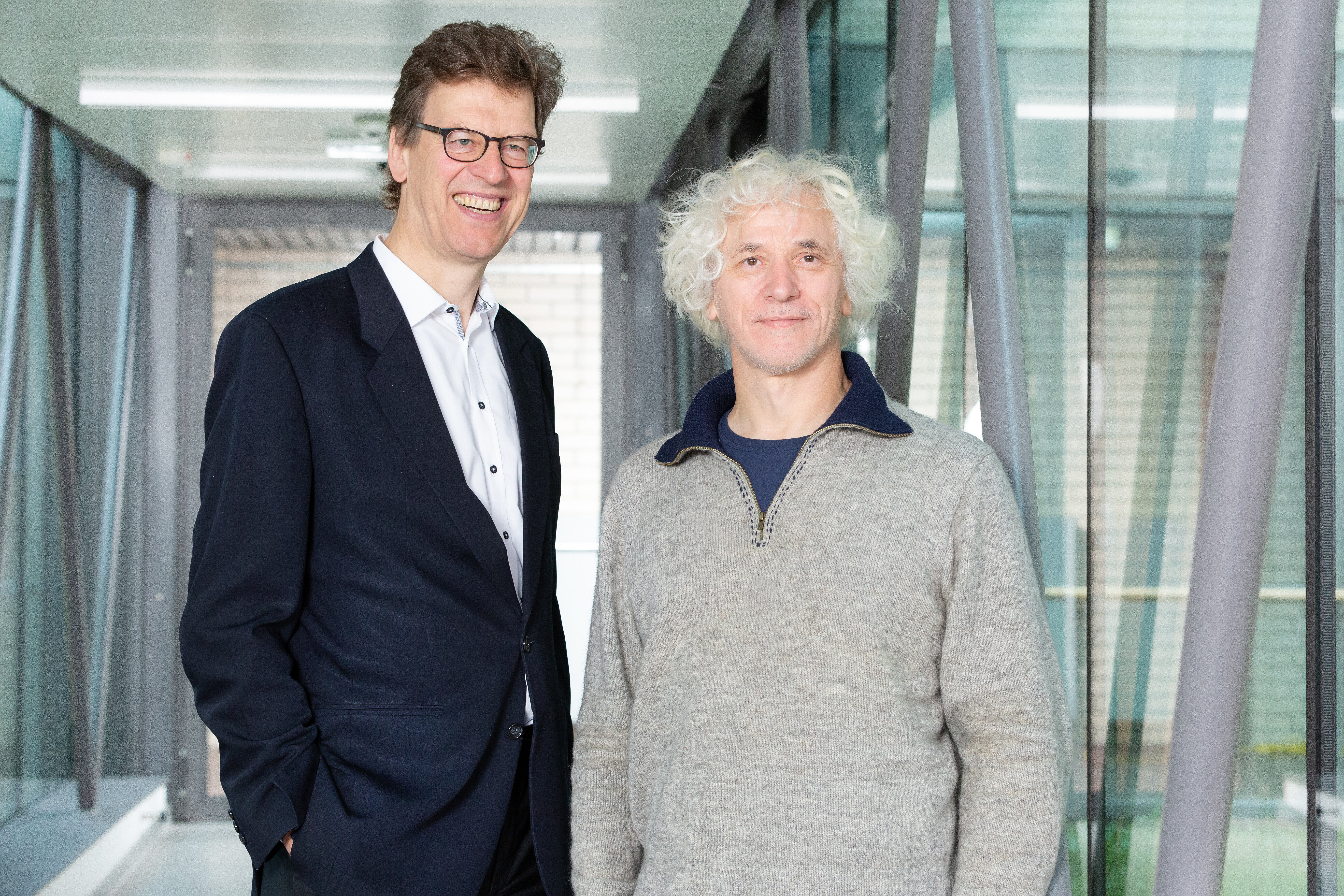
Christian Scherf and Josef Penninger: “Aiming for the top as a team”
Mr Penninger, Mr Scherf, you are the new leaders at the HZI and may not have been able to meet all members of staff yet. What can we tell the staff to expect, how do you see yourself as the new leaders?
Josef Penninger: (laughs) Christian, you go ahead.
Christian Scherf: (laughs) Sure, my pleasure. I am a manager with a height of 2.04 metres, so I'm relatively tall when I enter the room. To me it's important to listen first. I want to know what the staff's issues are so that I can develop these topics further and contribute my leadership expertise. I've been doing this for 20 years and can draw on a wealth of experience. I have learnt that you can develop topics better when you cooperate instead of working by yourself.
How would you describe yourself as a leader, Mr Penninger?
Penninger: What I am certainly not is a micromanager. I am usually up in the clouds and need people to ground me and bring me back down to reality. That's why I also need a great team, and Christian and I work really well together. I have set up an institute in Vienna and later took over an established major institute in Canada. That means I know both sides of institute development. Just like Christian said: You have to act in concert with others and take people seriously if you want them to come along with you. I believe that every person working for us is important, at every level; everyone needs to be heard and respected. And I promise: I will listen.
Your goal is to develop the Helmholtz Centre into one of the best infection research centres in the world. How far off are you on the way to becoming a world-leading centre?
Penninger: Not all that far. However, it's like a football team in the German Bundesliga: They're all really great, but the final efforts to get into the Champions League are essential. The HZI has been set up well by our predecessors with great scientists and a good organisation, but the final ten to 15 percent still need to be done. This will be strenuous. We need to position ourselves not only internally, but internationally as well. We have to look for talent and integrate ourselves into the global community. Whether we achieve this goal is another matter, but it is important to be confident of aiming to be among the world's best. Only then you build the steps to get there.
The goal in administration is certainly linked to the concept of new work, i.e. a mobile working culture, flexible working time models, virtual teams, partial home office - can all of this be implemented at the HZI?
Scherf: Yes, we are working on it, or we would be very old-fashioned. We aim to be an attractive employer for researchers and administrators. This means being able to work flexibly, balancing work and family life, offering continued education opportunities and much more. Working from home is not always possible; many researchers simply have to be in the lab. There are some administrative tasks that can be done at the home office, but there are also jobs that require you to be present, such as janitorial services. We are service-oriented in administration, as in fact our DNA is a service DNA. We want to enable scientists to realise their scientific work in the way they need to.
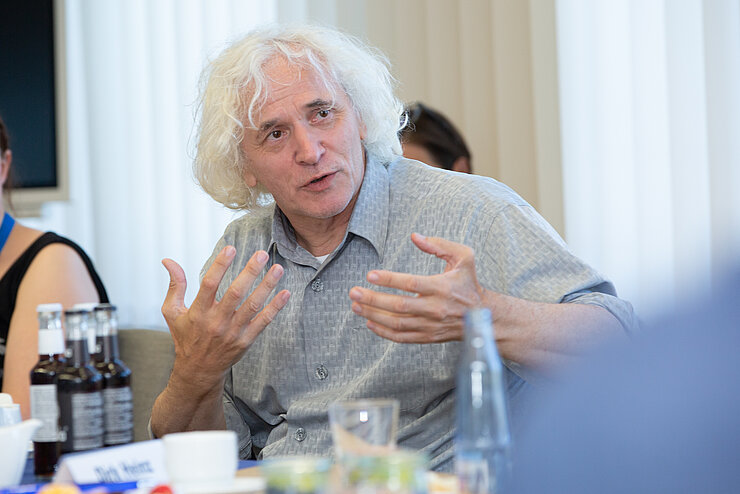
How do you find top researchers for the HZI?
Penninger: Simply by having very, very good positions and conditions to offer. Helmholtz is one of the largest research organisations in the world. We can compete with Harvard and other institutions. But it's not only money that attracts people to us, rather it’s the soft values, a culture. Young scientists need to be supported and promoted. I have often observed that if you really support smart people and build a biotope, a suitable playground around them, where they can work in peace and develop ideas, then very often something positive happens. In Vienna, we had people who needed five or six years to publish, but their publications changed the world and our general level of knowledge. We offer the opportunity for longer-term projects at the HZI. There is no doubt in my mind that we will be able to convince young top talents to join our institute.
What qualities should top researchers have?
Penninger: Creative chaos. (laughs) I mean this natural interest, this gleam in the eye - it's hard to describe. There are a lot of smart people in the world who are well educated, but only a special few who have that sparkle, that passion. Research is not easy to do. You may have great ideas, work on them for two or three years - only for nothing to come of it. That means you also have to be resilient. It's like a good painter, who has to learn how to paint in oils. However, that's still not all. Gustav Klimt had two brothers who were also great painters, but nobody knows of them to date. This raises the question: How do you recognise the next Gustav Klimt or Lionel Messi of science?
You want to set up 20 new research groups, how easy or difficult will that be?
Penninger: We have launched the first call for applications. Initially, there will be four positions, and later we will continue steadily and set up 20 positions - or even more including the clinician scientists. We also need the local structures to be established to allow the researchers to work properly right away. This will be done by Christian's team and some other people in the foreground and background, such as my deputy Thomas Pietschmann, who is doing an excellent job, and our fantastic scientific team.
Scherf: Let me add something about the locations: The HZI has grown intensively, but at the sites outside Braunschweig. The new funding also has a strategic dimension, because we are attracting young people of exceptional quality, securing the future here in Braunschweig.
Penninger: Exactly, a very important point. We are currently setting the course for the next ten to 20 years. This is, of course, a critical point that we have to approach very cleverly in order to attract the right people and establish the right structures.
You want research to produce "radically new" results. What do you mean by that?
Penninger: I am thinking of bacteria and viruses that we can learn from. They have survived four billion years of evolution, they are chemists and can do things that we know almost nothing about. We therefore want to see viruses and bacteria not only in a negative light, but also as useful. This is the direction we want to take at the HZI, for example in order to learn how to decompose plastics or produce energy cheaply. Climate change is also introducing viruses and bacteria to Germany that are not indigenous. They travel with mosquitoes, for example. We need to be prepared and offer solutions.
The aim is not only to conduct research, but also to found new companies?
Penninger: Of course, it's also about developing drugs that can prevent infections as a benefit to all humans. We also want to convince researchers not only to conduct research, but also to found companies. It takes courage, knowledge of how to do this, close cooperation with universities in Lower Saxony such as the TU Braunschweig and the Hannover Medical School and, of course, financial support and cooperation with great funding organisations such as the IBT and the DZIF. In the USA, relatively young companies can raise capital on the stock market, but this is more difficult in Germany and Europe. We want to tackle these issues together with politicians.
We are doing this as a hybrid interview: Christian Scherf is in Braunschweig, Mr Penninger, you are on the line. You still have a professorship in Vienna, do you have enough time for the HZI?
Penninger: Absolutely! (laughs) I have one hundred per cent of my time for the HZI. I have a 25 per cent professorship in personalised medicine at the medical university in Vienna. So I work 125 per cent, which is what I've been doing for many years anyway. My job in Vienna is to develop the new Eric Kandel Institute for Precision Medicine. Eric Kandel is one of my mentors, he is now 94 years old and received the Nobel Prize for the molecular control of memory in 2000. This is also a good opportunity for the HZI to put out initial feelers to Austria and establish joint projects and synergies. Vienna is the largest university centre in the German-speaking world with around 200,000 students, so it's a great opportunity for everyone.
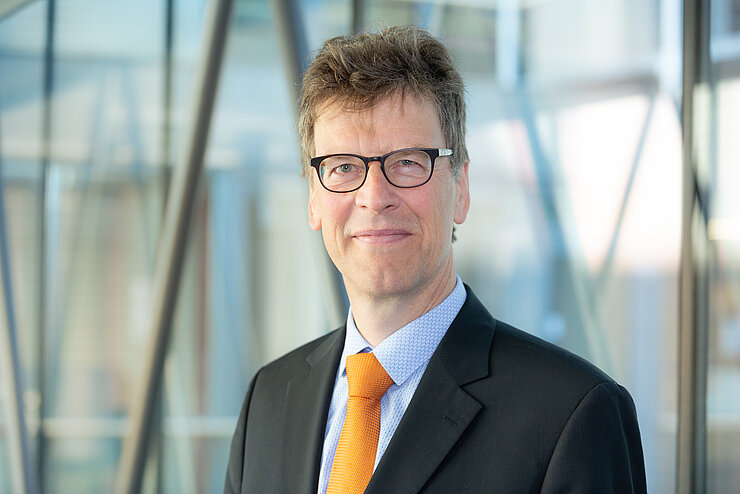
You are both so qualified that you can choose your workplace: Why did you come to the HZI in Braunschweig?
Scherf: There are several incentives. After working in physics for many years, I turned to life science. I am fascinated by the question of how we can influence and understand our lives. The fact that so many partners have to be brought together here at the HZI as a multiscience centre is also very appealing to me. And finally, I'm a native of the north; it gives me incredible pleasure to work in northern Germany, and this still includes Braunschweig. (laughs)
Penninger: I am interested in the HZI because Helmholtz offers the opportunity to establish it as one of the world's leading centres. There are very few places in the world where something like this can be realised. That's why I came to work with Christian and Thomas in Braunschweig and the great institutes and researchers and all the staff at the HZI in Greifswald, Würzburg, Hannover, Hamburg and Saarbrücken to contribute the final ten to 15 percent to the Champions League final.
Looking at your CVs, one can see that you repeatedly went on and said goodbye. Which was the hardest?
Penninger: All goodbyes are difficult for me. (laughs) I was sent to boarding school at the age of ten, so I've been out there in the world since then. It takes me a while to get used to things, but then I can't give them away very well. There is this Mexican saying: We are not only defined by the things we have, but also by the things we have lost. You always leave something of yourself behind and gain something new, get to meet new, amazing people.
Scherf: The farewells I've experienced have always been very easy to communicate. They had their own rationale and were never a break with something. The farewells varied in emotional intensity, but the focus was always on the new.
What does your usual day at work currently look like? I read, Mr Penninger, that you work 70 to 80 hours, don't you have to sleep, don't you have any friends ...?
Penninger:(laughs) Well, I get up at 6 a.m, read the 200 emails I received overnight, talk to my team. Then my research group in Canada wakes up and another 100 emails come in. At the weekend, I like to play football with my very good friends, this is my great passion that allows me to power down. I also try to reserve a few hours a week for reading, my second great passion. I am currently reading Don Quixote, part 2, which is truly fantastic, and before that Moby Dick, one of the greatest books ever written. So I don't just work.
Do you already have a club in Braunschweig that you want to play for?
Penninger: No, I am still looking. If someone needs a player my age, I’m ready to go. I get to play for the Austrian physician’s national team, which is great. We also play in the world championships. We came in last in Cancun, but it's the Olympic spirit that counts. (laughs)
Scherf: My day at work is that of a research manager with lots of meetings and appointments. It's important to make a decision in life regarding priorities. For me, it's important to strike a balance between being able to contribute and develop as a managing director and having a private life, a marriage and seven children. I have to be able to combine both and so far I have found: It is doable.
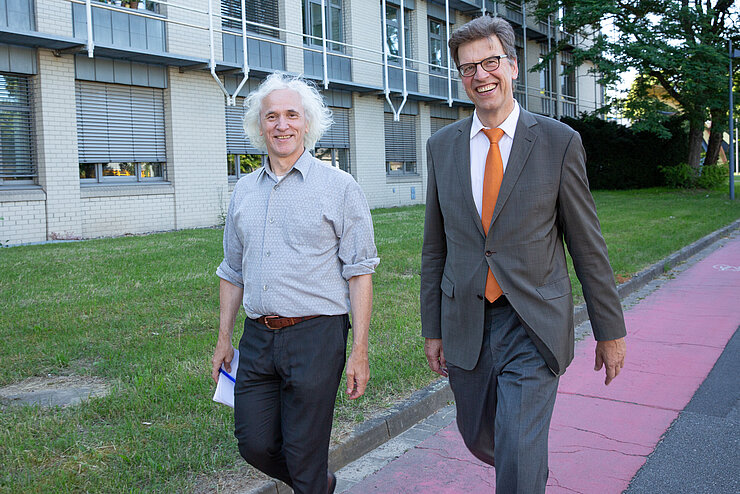
Where do you see yourself in five years' time?
Scherf: Is this a job interview? (laughs)
Penninger: (laughs) I’ll let Christian answer that.
Scherf: I hope to see myself in good health and, at the HZI, looking back on an intensive period of shaping the reality of professional life and looking ahead to exciting future developments of work. But at my age, the present is much more important than the future.
Penninger: I look at the HZI, which I would like to see in five years as a world-leading infection research centre, as one of the three or four places in the world where young people want to work. I see us as internationally embedded in infection research and in dialogue with students from Africa, Asia, America and Australia. Of course, it's not just the goal that is very important to me, but also the way to get there. We want to be a place that thinks about the future of work, about equal opportunities and diversity.
One more question: What makes you feel happy?
Scherf: When the people close to me are happy. It has a lot to do with my ambience.
Penninger: I used to go swimming in Canada; I became a cold-water swimmer. Alone in the sea. Sometimes sea lions swim along with me. When you become very calm and the world slows down, those are the moments when I am happy. Well, if Austria were to win the World Cup ... but that would be too much happiness, so I am glad that will never happen.
Is there anything else on your mind that you would like to get off your chest?
Scherf: What is very important to both of us is that we can work with each other. This is also very important to the extended management team.
Penninger: We have one of the best jobs: We get to discover things, we don't know in the morning what will happen in the afternoon, and we work to save and improve people's lives. Sometimes that works out. I can’t imagine anything better.
Interview: Claudia Gorille
Published: November 2023
